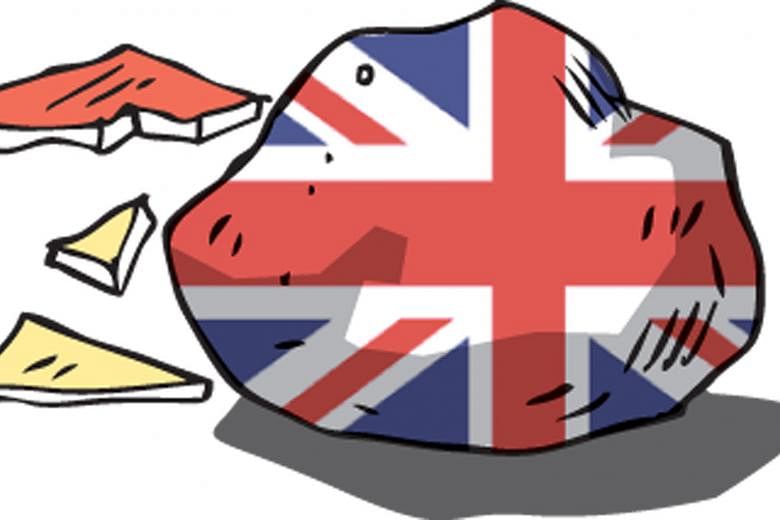The shocking Brexit vote last month sparked political and market chaos in the United Kingdom and around the world. Nearly a month on, with some of the smoke fading, how should we assess the impact of Britain's vote to leave the European Union?
I wrote in these pages in May that "Brexit will not make Britain the Singapore of Europe", but will expose the UK to significant economic and political risks. I stand by the judgment that Brexit is a major strategic mistake and will lead to substantial costs and uncertainties over the coming years.
From an economic and financial perspective, the impact on the UK has already been dramatic. The British pound is down to levels not seen since 1985, and a UK recession is increasingly likely on weaker business investment and consumer spending. The first rate cut by the Bank of England since 2009 is likely later this summer on the back of a gloomy economic outlook.
This is a self-inflicted wound for the UK, but it is also an action that affects the rest of the world. Small advanced economies are deeply exposed to the international effects of Brexit. And so the recent experience of Singapore and other small economies can provide a perspective on the potential global economic and political impact of Brexit. As the canaries in the mine of the global economy, what are small economies saying about the Brexit impact?
EQUITY MARKET IMPACT
First, small-economy equity markets confirm the expectation that there will be costs for countries deeply exposed to the British economy, but that there will be a limited direct effect of Brexit on the global economy more broadly (not surprising, as the UK accounts for less than 4 per cent of global GDP).

Just prior to the vote, the International Monetary Fund estimated that the economic spillover costs from Brexit would be particularly high for smaller countries in Europe, such as the Netherlands and Ireland. Indeed, equity market indexes in these directly exposed countries, most notably Ireland, have lagged other European indexes in the weeks after the Brexit vote. The implication is that Brexit is a material economic shock for those with a significant direct UK exposure. In contrast, equity markets in small Asian economies such as Singapore and New Zealand - with more limited UK exposures - have not experienced a significant Brexit impact after the initial shock of the vote passed.
Second, small-economy markets are, however, indicating that the impact of Brexit extends well beyond the direct effect of lower economic activity in the UK and related markets. There has been concern that Brexit could mutate into a global economic shock to the extent that it interacts with other possible global dynamics, such as a sharp China slowdown, rising protectionism, growing investor risk aversion, or a United States currency shock. And Brexit will contribute to ongoing economic and political turbulence in Europe, a much larger economic unit than Britain. To this extent, the indirect impact of Brexit could have outsized effects that radiate throughout the global economy.
Opinions on these indirect effects vary significantly. Some argue that these broader Brexit concerns are overblown and that markets will revert to reflecting the relatively modest direct effects. Others believe that Brexit has the potential to be a "Lehman moment" in a similar way to the catalyst for the global financial crisis in 2008. This uncertainty is one of the reasons that global financial markets have whipsawed over the past month.
Judging by the strong rally in equity prices over the past few weeks, there is a sense in many quarters that Brexit is not a systemic event for the global economy. Equity indexes in many global markets are back above pre-Brexit levels. In the past days, the major US indexes have hit record levels, recovering from a 5 per cent sell-off in the week after Brexit. This strong equity market performance is also seen in many small advanced economies, including Singapore.
SMALL COUNTRIES, SAFE HAVENS
But the small-country experience also shows signs of market caution with respect to the global economic outlook. For example, it is instructive that small countries outside the euro zone have acted as safe havens, notably Switzerland and Singapore and to an extent also Denmark and New Zealand. Many of these currencies have experienced marked upward pressure since Brexit in ways that are not supported by the strength of their domestic economies. This inflow of capital has also depressed yields: In Switzerland, for example, the entire yield structure of Swiss bonds, out to 50-year maturities, is negative. This suggests increased investor risk aversion post-Brexit.
Singapore is often regarded as a particularly useful "canary in the mine" because of its very high exposure to the global economy. Singapore's growth forecasts have been further reduced for 2016 and 2017 by several forecasters, partly on the basis of Brexit-induced concerns about the strength of the regional and global economy. And yet the Singapore dollar has remained strong against the US dollar and the nominal effective exchange rate, used by the Monetary Authority of Singapore for monetary policy, has strengthened to record levels, partly in response to safe haven flows into Singapore.
So Brexit has an impact even half a world away from the epicentre of the shock. This small- economy experience suggests that there is a real risk that Brexit will have a material indirect effect on the global economic outlook. This experience is consistent with other evidence of safe haven flows, for example into gold and US Treasuries.
MAJOR POLITICAL SHOCK
Third, small countries from Singapore to Scotland have been quick to recognise that Brexit is also a major political shock. It has the clear potential to lead to institutional rupturing in the UK and in Europe, particularly given the other pressures facing Europe. And to the extent that Brexit reinforces the arguments for protectionism in several large countries, it could further weaken the liberal, rules-based global economic system that has supported globalisation - and which has benefited small countries disproportionately.
These are longer-term trends, of course, and they won't fully manifest for some time. But small economies understand the broader impact of Brexit acutely, and the high level of concern in small country capitals is instructive. Prime Minister Lee Hsien Loong noted that "disengaging and turning inwards will likely lead to less security, less prosperity and a dimmer future".
Indeed, policymakers in Scotland, which is part of the UK, are considering options for remaining in the EU, and post-Brexit opinion polls in several small European countries are registering strong increases in support for the EU.
Small economies like Singapore are a good barometer of the economic and political impact of Brexit. And small economies are suggesting that the indirect effects of Brexit pose meaningful economic and political risks. Brexit will make an already challenging global economic and political environment even more difficult for small economies - and others - to navigate.
- Dr David Skilling is the director of Landfall Strategy Group, a Singapore-based economic and political research and advisory firm.



